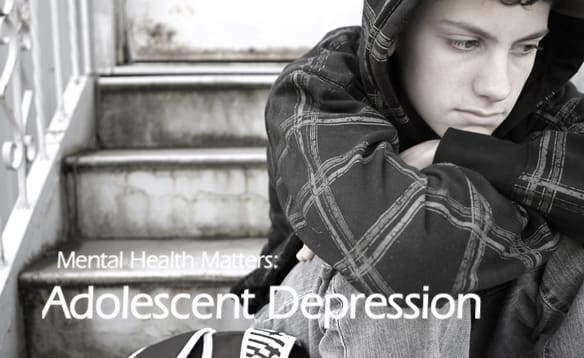|
A parent notices their 14 year old son seems less interested in baseball and hockey, things he used to love to watch and play. When they ask questions their son gets agitated and angry. They try to empathize but he does not seem soothed by their attempts. They get more concerned when his teachers share some concerns about the quality of his homework and his interactions with friends. Is this a teenager going through normal adolescent development or is mental illness starting to peak through?
It is true that signs of mental illness usually start during early teen years. Sometimes it is hard to tell the difference between puberty and/or normal adolescent development and a more serious mental illness, defined as a mental, behavioral, or emotional disorder with a varying impact ranging from mild, moderate or severe impairment. With depression, which is where we will focus this article, the behaviors are often a way to cope with emotional or cognitive distress. Generally parents or teachers will see a marked change in the way the teen is functioning. Some Warning Signs of Depression are when the teen:
Tips to Help 1. Know what depression looks like. There are signs and symptoms that friends and family can pick up on. Discuss the signs. 2. Don't keep secrets. Sometimes parents feel like they caused the problem, feel responsible for the problem, hope their child will grow out of it or want to protect their child so they wait to intervene. The longer you wait the more persistent the symptoms will be. 3. Know what it means to enable. If your completing their homework, calling out sick of their behalf, cleaning up their messes, making excuses for their behavior it is only going to prolong the disruptive behavior. 4. Emotional Connection is key. Sometimes it means a hug and just being emotionally available. Statements like: I am always here to talk, I love you, I know this is so hard for you, I know your going through a hard time and we are going through this together, I’m not giving up on you, you might be going through a hard time but I love you always can help teens feel heard, understood and supported. 5. You cannot will it to go away. When we hope it changes or goes away and wait we often feel frustrated because as hard as you try you cannot will depression better. 6. Know you didn’t cause the depression. One of the reasons parents don’t intervene is because of the enormous guilt. 7. Get support. If you learn about depression you will be better able to offer support. Support groups for family members can be super helpful. 8. Show compassion. Even when treated, depression will impact a teen's mood and behavior. Negative feedback, picking fights, etc. is not helpful. 9. Set boundaries. Because someone has depression does not give them permission to punch holes in the wall, not complete homework, or treat family members in hurtful ways. Instead be clear about rules of the house and what healthy alternatives you support. For instance, you cannot punch the walls but I will take a run or bike ride with you, you can journal, we can talk, you can go outside to calm yourself. 10. Ask for help. A good time to get an evaluation by a therapist is when the distress happens in more than one area of life and lasts more of the day than not for at least a week period. A psychological assessment is key to understanding your teens behaviors. There is overlap between diagnoses (i.e. anxiety, depression, ADHD) and a trained professional can help distinguish so to find the appropriate treatment interventions. Treatment can include, but isn’t limited to, family therapy, medication, cognitive behavioral therapy, and play therapy for children and teens. If you think someone is in imminent danger you can always call 911 and ask for a wellness check. For less severe situations you can call non-emergency resources or the National Suicide Prevention Lifeline: 1-800-273-TALK (8255). 1/9/2022 03:36:42 pm
Thanks for elaborating how depression can make you attempt self-harm over the negativity swarming in your head. I saw my cousin post about negative things online, and I've always wanted to help him out. Maybe he should try visiting a counseling center for advice if this feeling doesn't go away. 3/25/2022 09:44:38 am
Thank your for the information you gave about how to tell when to get the help of a counselor for a depressed teen. It is good to know that you should seek help if the distress is in more than one area of life and lasts over most of the day for at least a week. My niece has been distressed for about three months, with very little time spent out of her depression during the day. She is being affected in school and in her social life. It sounds like it is time to contact a counselor for her as soon as possible. 4/5/2022 04:09:53 pm
It really helped when you elaborated on depression symptoms and how to identify them in our loved ones. Last week, my sister said she's very worried about her son's well-being and thinks he might be depressed. Personally, I think it'd be best if my sister takes her teen to see a therapist, so I'll suggest it and share your tips with her right now. I appreciate your advice on how anxiety's a common sign of depression. 9/19/2022 07:01:51 am
I appreciate you sharing this wonderful and informative piece that can greatly help everyone that suffers from depression and their concerned family and friends. Thank you so much for this. Comments are closed.
|
Categories
All
Archives
March 2023
|
[email protected]


 RSS Feed
RSS Feed